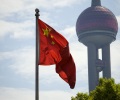China releases details on its own blacklist, raising uncertainty for foreign businesses

The Chinese government is stepping up pressure on foreign businesses not to run afoul of Beijing, as the White House continues to target some of the Asian giant’s largest technology companies.
China’s Ministry of Commerce released long-awaited provisions on its so-called “unreliable entity list” over the weekend. The vaguely worded document mirrors the U.S. Commerce Department’s entity list that restricts named companies from accessing items originating in the U.S.
“Beijing will likely name at least one US company to the (unreliable entity list) between now and year-end – possibly even in coming days – but will use this tool in a targeted fashion, particularly in its early stages,” Michael Hirson, practice head, China and Northeast Asia, at consulting firm Eurasia Group, said in a note released Monday.
“The coming debut of the (unreliable entity list) underscores the dilemma facing (multi-national corporations) in China, who are squeezed between the legal and political dictates of the US and its Western allies on the one hand and Beijing on the other,” he said.
The Commerce Ministry first announced it was establishing the unreliable entity list in May 2019. The move came shortly after U.S. President Donald Trump’s administration said it was adding Chinese telecommunications giant Huawei to a blacklist, which prohibits the company from working with its U.S. suppliers. Huawei’s revenue last year missed internal forecasts by $12 billion, while profit growth slowed from the prior two years.
Provisions from the unreliable entity list released Saturday laid out consequences for a foreign entity — a company, organization or individual from another country — that is deemed to be a danger to “national sovereignty, security or development interests of China,” according to an English-language version of the policy on the Commerce Ministry website.
Authorities can also add a foreign entity to the list if it suspends “normal transactions” or takes “discriminatory measures” against a Chinese entity “which violates normal market transaction principles and causes serious damage to the legitimate rights and interests of the enterprise, other organization, or individual of China,” the document said.
The consequences for an entity added to the list could include: restrictions or prohibitions on China-related trade, investment in China and travel or work permits.
The release of the list comes a day after the U.S. Commerce Department announced a ban on U.S. transactions using WeChat — a social messaging app operated by Chinese technology giant Tencent, and TikTok — a short-video app backed by Chinese start-up ByteDance.
China’s Commerce Ministry said in an online statement that the unreliable entity list will not target a specific country or entity. Other statements on the ministry’s website about the unreliable entity list emphasized that China still welcomes foreign direct investment and foreign businesses, which are an important contributor to the national economy.
“The unreliable entity list regulations leave a fair amount of discretion to be applied broadly. We hope significant restraint is exercised in utilization of the list,” the U.S.-China Business Council said in a statement. “Companies increasingly feel squeezed between the US and Chinese governments, where complying with the rules of one government may cause them to run afoul of rules of the other government.”
Joerg Wuttke, president of the European Union Chamber of Commerce in China, told CNBC in an email: “The vagueness of the language would be disconcerting on its own, but that it comes at a time in which European companies in China are already worried about being next on the chopping block of an increasingly politicised business environment makes it all the more distressing.”
The American Chamber of Commerce in China and British Chamber of Commerce did not immediately respond to CNBC’s request for comment.
Possible additions to the list
Hirson said in the Eurasia report that actions from the Chinese side would likely focus on products with a domestic competitor and avoid disrupting imports of products that China’s technology industry needs. Another factor, he said, could be companies involved with U.S. arms sales to Taiwan.
According to the consulting firm, plausible targets include:
. Cisco
. Dell/EMC
. HP
. Lockheed Martin
. Rockwell Collins
On the other hand, the report said less appealing targets include:
. Apple and Microsoft — “high global visibility and reputations as good corporate citizens within China.”
. Chipmakers Qualcomm and Intel/AMD, which are “important suppliers who have made strong efforts to establish positive relationships in country.”
. Boeing, which “sells Apache helicopters to Taiwan, but its critical role for China’s airline industry and profile as a flagship US company will make Beijing cautious about targeting it and inflicting any serious damage.”
Long-term implications
Tensions between the world’s two largest economy have escalated over the last two years, beginning with trade and spilling over into technology and finance. Many analysts expect pressure from the U.S. to pick up heading into the November presidential election, in which Trump is running for another term. However, a win by Democratic nominee Joe Biden is not predicted to soothe the bilateral relationship much.
“The United States’ strategic goal is to prepare to use five years to defeat Chinese companies and allow U.S. companies in this time to quickly catch up or overtake (China),” Wei Jianguo, a former vice minister at China’s Ministry of Commerce, told reporters in an online forum Monday, according to a CNBC translation of his Mandarin-language remarks. He is now vice chairman and deputy executive officer at Beijing-based think tank China Center for International Economic Exchanges.
“So cutting off semiconductors and banning TikTok are only a beginning for the U.S.,” Wei said. “Regarding this, we have to prepare mentally for the long term.”
He said he hopes the U.S. can gain clarity on the situation and look for ways to cooperate with China instead.
Source: CNBC

 Hellenic Shipping News Worldwide Hellenic Shipping News Worldwide, Online Daily Newspaper on Hellenic and International Shipping
Hellenic Shipping News Worldwide Hellenic Shipping News Worldwide, Online Daily Newspaper on Hellenic and International Shipping























 PG-Software
PG-Software